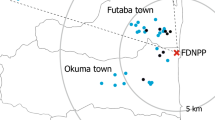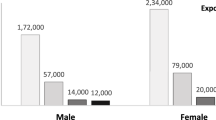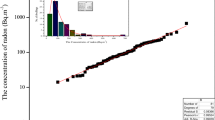Abstract
WE have recently been investigating airborne concentrations of radon and thoron daughters, by monitoring the β-activity of a small asbestos filter through which air is drawn at a rate of about 25 l./min. A shielded end-window counter tube is mounted above the filter, giving an overall counting efficiency of 22 per cent for potassium carbonate samples. The filter is changed daily, and decay measurements have shown that recorded activity is almost entirely due to radium B and C. Assuming equilibrium concentrations of radon and radium A, B and C, an equilibrium counting-rate in counts per minute can be multiplied by 0.714 to obtain an estimate of the radon concentration in curie × 10−18 per cm.3 of air.
This is a preview of subscription content, access via your institution
Access options
Subscribe to this journal
Receive 51 print issues and online access
$199.00 per year
only $3.90 per issue
Buy this article
- Purchase on Springer Link
- Instant access to full article PDF
Prices may be subject to local taxes which are calculated during checkout
Similar content being viewed by others
Author information
Authors and Affiliations
Rights and permissions
About this article
Cite this article
SMALL, S., LILLEGRAVEN, A. & STOREBØ, P. Natural Airborne Radioactivity at Kjeller, Norway. Nature 181, 1197–1198 (1958). https://doi.org/10.1038/1811197a0
Issue Date:
DOI: https://doi.org/10.1038/1811197a0
Comments
By submitting a comment you agree to abide by our Terms and Community Guidelines. If you find something abusive or that does not comply with our terms or guidelines please flag it as inappropriate.



